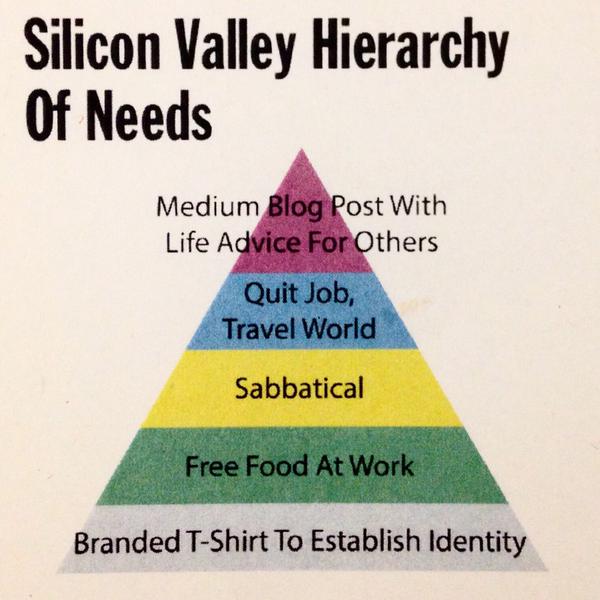The Hard Thing About Hard Things from Ben Horowitz has received many accolades from, well, everyone, so it was surprising to hear that most people in our book club weren’t raving fans. However, it did inspire some great discussions. Here are a few things we talked about:
- The book is a collection of war stories that pretty much just goes through his entire career, and he talks about both his successes but also goes in depth about the things he didn’t get right
- He starts off the book with the concept that every business is different and nothing can be applied to every situation, then goes on to teach quite a few lessons through out the entire book
- It’s probably not the right book if you are looking to learn what to do at a start up. Most of us are not at a level where a lot of these lessons are applicable yet.
- There is a new trend in Silicon Valley to hero worship successful people and an entirely new hierarchy of needs that just seems a bit ludicrous to people outside of Bay Area. This book is at the tip of the pyramid with all the other self-actualized Medium bloggers.
- Although the use of “she” as the pronoun of choice when it comes to imaginary CEOs is mostly semantics and there aren’t that many females included in the narrative, it’s still an important gesture to bring attention to the issue of gender in the high ranks (also, this group apparently also has no love for Lean In)
- #blacklifematters <> #alllifematters. The world is unfair, but it’s more unfair for some than others, and being politically correct is not the right way to solve problems.
- Unconscious bias example – women tend to be the ones doing traditionally “menial?” tasks such as taking notes at meetings. But at the same time, taking notes is a great way to connect to higher ups attending meetings. Take advantage of certain biased situations.
- Technological advances are made by people who are smart and “lazy”, they’ll think of
- How important is it to hire for fit versus ability?I personally like his idea of hiring for strength instead of lack of weakness. At the executive level, it’s probably more important to get the right skills, and spend a lot of time on integrating the hire into the culture instead.
- Is there a talent shortage? With the amount of investments pouring in, working for a startup no longer means taking a pay cut for potential upside in the future. Places like Google/FB/Uber are like the Yankees, who have all the right incentives to attract top talent, and some equally great companies may just have to settle for mediocrity.
- Not everyone at the company needs to be A players, especially as the company grows. A players are most likely not going to stay somewhere that doesn’t challenge them/utilize their full potential.
- There is no loyalty in Silicon Valley, people are greatly incentivized to jump from one startup to the next, and poaching is the norm, not the exception.
- Good product managers vs. bad product managers (too long, see excerpt here)
- You should not be able to do the jobs of your department heads better than they do. That’s why you hired them.
A few other things we didn’t get to talk about that I found useful:
- When your company is facing an existential threat, all you can do is put everything into one lead bullet to fight the battle of its life
- You can’t train to be a CEO, you just have to learn on the job
- There are peacetime CEOs and wartime CEOs, and it’s rare for one person to do well in both situations
- Don’t hire for future scale, hire the right person for the right job for right now
- Take care of the people, the product, and the profits, in that order
And finally, the central lesson of it all: “Life is a struggle. The struggle is where greatness comes from.”


Leave a Reply